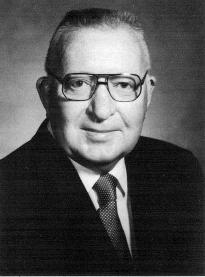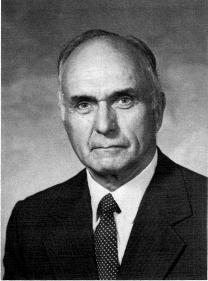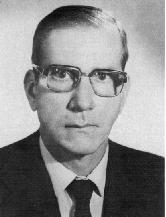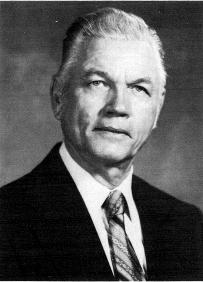1985 Honorary Life Member Selections
 JIMMY S. GREGORY
JIMMY S. GREGORY
Jimmy S. Gregory was born at Manitou Springs, Colorado, June 12, 1922. He grew up on a seed potato farm at Divide, Colorado, where he attended elementary school. He attended high school in Colorado Springs, Colorado, where he graduated in 1938.
Having grown up on a seed potato farm, he received an early introduction to potato culture and, particularly, the production of certified seed. One of his primary responsibilities on the farm was that of roguing and supervising the roguing crew.
Jim entered Colorado Agricultural and Mechanical College, now Colorado State University, at Fort Collins, Colorado, the fall of 1938. His early experiences and interests with seed potato production quite naturally led to
his enrollment in the College of Agriculture seeking a degree in horticulture. While pursuing his undergraduate work in horticulture, Jim also enrolled in the Air Force Cadets. He met Georgia Thompson while she was vacationing in Colorado. They were married December 11, 1941, one week after Pearl Harbor. They are the parents of two children–Jimmie Sue and George Stuart.
Jim won his silver wings and commission as a 2nd Lieutenant in the U.S. Air Force in 1943. Most of his military service was spent flying cargo and military supplies over the “Burma Hump.” He was released from the Air Force in 1947 with the rank of Major. Following his release from the Air Force, Jim was a commercial pilot for eleven months, flying United Air Lines Denver-San Francisco route. Jim re-entered Colorado A&M in 1948 and received his B.S. degree in horticulture in 1950, graduating cum laude. He continued his studies at Colorado A&M while working summers in the Colorado seed potato certification program. He received his M.S. degree in Horticulture in 1952. He received appointment to the University of Idaho, College of Agriculture staff as Extension Potato Specialist in June 1952.
During his tenure as Idaho’s Extension Specialist, he authored a number of extension bulletins and pamphlets covering topics related to potato production, disease control, irrigation, and storage. He worked closely with County Agents in extension potato program development and problem solving.
He continued to have a special interest in seed potato improvement and maintained a close cooperative, working relationship with the Idaho Crop Improvement Association and its personnel. He conducted potato disease identification and roguing schools; was a collaborator in The University of Idaho’s Foundation Potato Seed program, and assisted in reading the California winter test plots. He was always a strong advocate of planting only certified seed.
In 1956, Jim resigned his position as Extension Potato Specialist to accept employment with L.E. Stephens, at Blackfoot, one of Idaho’s major potato grower-shippers, as farm manager and potato buyer. A year later, in May 1957, he became field representative and buyer for Sunspiced, Inc., a fresh shipping company and a wholly owned subsidiary of American Potato Company, a dehydrated potato processor. Both were headquartered in Blackfoot, Idaho.
In 1965, he became Assistant Manager for Raw Materials with responsibilities for procuring potatoes for both the fresh shipping operation at Sunspiced and for American Potato Company’s processing plant. He was promoted to Manager in 1971. In the meantime, the companies were expanding with the acquisition of Rogers Brothers shipping and processing facilities in Shelley, Idaho Falls, and Rexburg, and in establishing operations in Washington State and in Wisconsin. In 1980, Jim was named Vice-president Idaho Raw Materials Procurement. He retired November 1, 1984.
Throughout his career, Jim cooperated and worked closely with all segments of the potato industry to promote its improvement and well-being. He worked closely with University of Idaho research and extension workers in developing and promoting county, area, and state potato schools and tours. He was a staunch supporter of the area extension potato specialist programs serving on numerous program planning and advisory committees. He had on-going programs for training his company’s field men and improving his contract growers’ cultural practices, potato handling and storage improvement programs. He was a strong supporter of bruise prevention and quality improvement programs and was instrumental in having bruise-free and other quality improvement incentive payment clauses included in his company’s grower contracts.
Jim served for many years on the Idaho Potato Commission’s Research and Education Committee for evaluating and funding potato research and extension projects. He was a member of the Idaho Potato Processors Raw Products Committee and active in the Idaho Grower-Shippers Association, advising member companies on fresh market quality problems and control measures.
Jim was a long-time member of The Potato Association of America and attended many of the Association’s meetings. He served on The PAA Board of Directors from 1966 to 1968. He was responsible for his company’s participation in PAA as a sustaining member and he solicited sustaining memberships from a number of other companies. He served on Idaho local arrangement committees hosting PAA annual meetings in both 1964 and 1972.
Because of his long service and devotion to improvement of not only his own company’s potato program but also that of Idaho’s and America’s potato industry, I am pleased and honored to present Jimmy S. Gregory to The Potato Association of America for Honorary Life Membership.
Jay G. Garner, Nominator
 JOSEPH L. HARRINGTON
JOSEPH L. HARRINGTON
Joe Harrington was born in Patten, Maine where he attended local schools and, in 1940, graduated from the University of Maine with a B.S. in Agronomy with highest honors. In 1944 he married Margaret Cheney and they have three daughters, two sons and eight grandchildren. He was a captain in the U.S. Marines from 1941 to 1945.
Joe retired in February 1985 from his most recent position as Director of the Division of Plant Industries of the Maine Department of Agriculture and Secretary of the Maine Seed Potato Board. His entire life has been devoted to the potato industry which started on his own potato farm in Patten, Maine from 1945 to 1955. He then joined the Michigan Cooperative Extension Service as a potato marketing agent. In 1957 he joined Frito-Lay Inc. and was instrumental in developing some new areas for potato chip raw product supplies particularly Maine, Michigan and Colorado. He was also a leader in developing a concept of pre-season contracts. After a brief return to Maine to work with the Snow Flake Canning Co., he returned to Michigan in 1964 to serve as General Manager of the Chief Wabasis Potato Growers Association in McBride. It was through Joe’s leadership that the Association changed from a tablestock and fresh marketing organization to one that today deals almost entirely with potato chip contracts and raw product production. Joe was a leader in the total Michigan potato industry and served as a member of the Michigan Potato Industry Council from 1966 to 1970 and Chairman in 1968-69. In 1970 the Council evolved as the current Michigan Potato Industry Commission. In 1971 Joe left the Chief Wabasis organization and worked with H.H. Evon, Sunshine Biscuit and Bachman Foods before joining the Maine Department of Agriculture in 1978. Joe truly has devoted his career to the betterment of the entire potato industry. He has been a member of The Potato Association of America and has been particularly active in the Certification Section by serving both as a Director and as Chairman.
One support letter stated that “Joe Harrington exemplifies those individuals whose dedication and contribution to the potato industry should be the criteria for measuring honorees for lifetime membership in The PAA.” His sense of integrity and forthright manner of dealing with people exemplifies the type of person that makes the U.S. potato industry strong. Our sincere congratulations to Joe and Margaret and their family for this well deserved recognition.
R.W. Chase, Nominator
 NELSON ESTRADA RAMOS
NELSON ESTRADA RAMOS
Nelson Estrada was born in Medellin, Colombia, in 1924. He received his B.S. degree in agronomy at the National University of Colombia in 1948. The first three years of his career were spent working in Colombia as a potato breeder with Prof. J.G. Hawkes, the English botanist and potato taxonomist. From this work came the first utilization of the hybrid vigor from tuberosum-andigena crosses. From 1952 to 1967, Nelson worked in potato breeding at the Colombian Ministry of Agriculture, associated with the Rockefeller Foundation Agricultural Program at Tibaitata, near Bogota.
His graduate studies were done at the University of Wisconsin, where he received his M.S. in genetics in 1957 under Dr. R.H. I-Iougas, and his Ph.D. in plant breeding in 1963 under Dr. D.C. Smith. Nelson returned to Colombia and continued his work in potato breeding at the Colombian Institute of Agriculture (ICA) from which he retired in 1973. During this same period (1965-1972), he also held the position of Professor in Plant Breeding and Genetics at the National University of Colombia. After retirement, Nelson worked as a potato geneticist for the International Potato Center (CIP) in Lima, Peru, from 1973 to 1980. He developed new lines of frost and late blight resistance from wild and primitive potato germplasm. Now, twice retired, he works as a consultant for both ICA and CIP, continuing his work with frost and late blight-resistance breeding.
During his long and successful career, Nelson and his group released 30 varieties in Colombia. Six of these 30 varieties are considered as the most important in Colombia–Montserrate, Purace, Pardo Pastusa, Capiro, Guantiva, and Huila. Eighty percent of Colombia’s 600 thousand acres of potatoes are planted with Nelson’s varieties. In Ecuador, the most important variety, Santa Catalina, is an Estrada hybrid. His varieties are also popular in the Andean part of Venezuela, and Peru recently released Perricholi and Tahuaquefia, hybrids he developed while working at CIP.
Nelson has been an active member of the Latin American Potato Association, the American Potato Association, and the European Potato Association. He has travelled widely in Europe and the Americas, participating in meetings of these associations and in seminars on plant breeding and cold resistance. He has published more than 100 scientific articles (in English and Spanish) and has been one of the most consistent contributors from Latin America to the AmerT”can Potato Journal.
In 1982 Nelson received the prestigious Colombian National Award of Science from the “Alejandro Angel Foundation” for his work on breeding for frost resistance in the potato. For his many accomplishments and contributions to the world potato industry, we are happy to bestow on Nelson Estrada Ramos, Honorary Life Membership.
James E. Bryan, Nominator
 JOHN A. SCHOENEMANN
JOHN A. SCHOENEMANN
John A. Schoenemann was born in Milwaukee, Wisconsin, on July 26, 1923. Despite the metropolitan surroundings, John got an early start with vegetable production by working in his father’s truck farm and greenhouse operation. After graduating from high school, John entered the University of Wisconsin-Madison, where he earned a B.S. degree in Soils in 1950. In that same year, John became Horticultural Agent for Racine and Kenosha counties, thus beginning his long career in extension. However, John continued his education and, in 1954, received his M.S. degree in Horticulture and was appointed Extension Horticulturist-Vegetable Crops. This position, which he still holds today, was newly created by the Department of Horticulture and included extension programming responsibilities for potatoes.
While carrying out his extension program, John began his Ph.D. studies with major emphasis on agricultural economics and minors in horticulture and agricultural journalism. He received his Ph.D. degree in 1959. John married the former Fay Yarbough in 1948. They have two children, Mark and Eric.
John has been closely associated with the development of Wisconsin’s potato industry for the past thirty years. He has effectively used his knowledge and experience to support and guide the industry’s progress. His approach in working with the industry has exemplified the “extension method.” Through various production and marketing programs, John effectively took the latest in research and technology and conveyed it to growers in the form of production recommendations. He then assisted growers in the implementation of those recommendations. In this regard, John was always available to help growers.
John also conducted research which supported his extension efforts. For example, as Wisconsin’s Central Sands Area was in the early stages of development, John recognized the potential for Russet Burbank production. His research formed the basis of recommendations for the production of Russet Burbanks on irrigated sands. In addition, he has provided leadership in the evaluation of potato varieties. For many years, John has conducted variety trials in the state’s major production areas. This assured the adaptability of varieties to a given production area. He has also been responsible for Wisconsin’s contribution to the North Central Trials. Results of these evaluation efforts have kept Wisconsin’s growers and processors current as to variety developments. The results have been particularly valuable to the state’s seed potato growers.
John has also been instrumental in expanding marketing opportunities for Wisconsin’s potato growers. For example, he assisted the start-up of a multi-grower owned storage and packing facility. This operation, Central Sands Produce, now stores, packs and markets one million hundredweight of potatoes yearly. John worked closely with processors as they evaluated Wisconsin for processing facilities. Such efforts contributed to the location of two major processors in central Wisconsin. John’s annual marketing outlooks highlighted the winter potato meetings and were used by growers in planning production and marketing strategies.
John’s major objective in extension has been education, keeping growers informed of the latest in research and technology. He has provided leadership in the development of high quality educational programs and publications. He has been an advocate of the interdisciplinary approach to grower education and has effectively used available expertise. The Area Potato Meetings typify this approach to grower education. John has continually refined these meetings, particularl3z the program content. The result has been increased grower interest and attendance. Over the years, John has been successful in expanding the knowledge base of Wisconsin’s potato industry.
John has achieved national recognition for his knowledge in potato production and marketing. His monthly column in the Ameffcan Vegetable Grower has provided timely and useful production information, as well as reasoned market outlooks. John contributed the chapter on marketing in the book “Potatoes: Production, Storing, Processing”, edited by Ora Smith.
National recognition was also achieved through John’s participation in several professional associations, most notably The Potato Association of America. He has contributed much over the years to PAA. He has served on a variety of committees including the old “marketing” committee. John served on the Board of Directors from 1969 to 1972. He was elected Vice-President in 1975, President-Elect in 1976 and became President in 1977. John is also a member of the American Society for Horticultural Science and the American Agricultural Economics Association. While largely recognized for his contributions to the potato industry, John has also given much to the University of Wisconsin; its College of Agricultural and Life Sciences, the Department of Horticulture and the Cooperative Extension Service. He has given unselfishly of his time and experience by serving on a multitude of committees and by assuming some administrative functions. John recently completed a one-year term as Chairman of the Department of Horticulture.
John A. Schoenemann has served the Wisconsin potato industry, PAA and the University of Wisconsin for thirty-five years. Perhaps the hallmark of this career has been the dedication and professionalism of this service. This has earned John the respect of the industry and university communities alike. It is indeed my pleasure to present John A. Schoenemann for Honorary Life Membership in The Potato Association of America.
David Curwen, Nominator